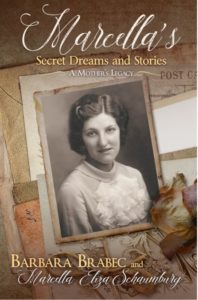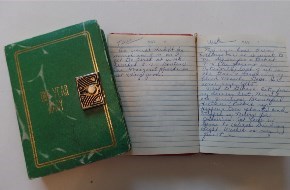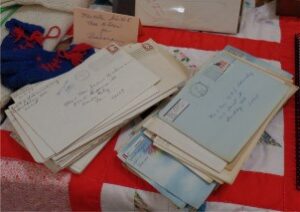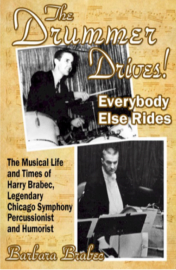The Historical Importance of
Family Letters and Journals
by Barbara Brabec
Our family histories are being lost because no one is saving written details for posterity. Real letters cannot be replaced by phone calls, email and text messages, or Facebook posts. “Historians will find that collections of serious letters end after 1996,” says Gary K. North, economic historian and author. “The treasure trove of letters that historians have used for two centuries will cease.”
I WILL NEVER FORGET the day Mother handed me 25 years of my life on paper. I was in my early forties then, married about 15 years and just beginning to test my wings as a writer. Mother and I were in the kitchen reminiscing over cups of coffee when she suddenly got up from the table, dragged a chair over to the kitchen cabinets, and climbed up to reach into the furthermost corner of the highest shelf. As I watched in puzzled silence, she pulled out two old shoe boxes tied with string and handed me the greatest gift she would ever give me. “Would you be interested in reading all the letters you’ve sent me since you left home?” she asked.
I hardly knew what to say as I opened the boxes and realized I was holding a collection of my weekly letters that detailed everything I’d done each week of all those years. Mother was my best friend and confidant, the one person I knew I could trust with my secret dreams, worries, fears, dumb things I’d done, special accomplishments, people I’d met, places I’d gone, on and on. This letter surprise couldn’t have come at a better time, because I was then in change-of-life mode asking myself, “Who am I, where am I going, and how do I get there from here?”
In reading those letters, I began to see all the ways I’d changed, and why. More important, I was able to relive many events of my life that I’d almost forgotten—special times of joy and excitement, my early days as a musician, my love life, how marriage had changed me, and so on. I had documented both the good and the bad times and the lessons I was learning from each new life experience.
I’ve often thought that most of us spend our whole life trying to figure out who we are and why we’re here, and those letters were simply invaluable to me. As Arthur Schopenhauer (1788 1860) once observed, “If we were not all so interested in ourselves, life would be so uninteresting that none of us would be able to endure it.”
Preserving a Family’s History
I HAVE LONG BEEN the caretaker of hundreds of handwritten letters and colorful postcards dating back to the late 1890s that were passed down in my family from one generation to another. My youngest sister is now preserving the collection of photographs taken in those years, and both my sisters and I are grateful that Mother and Grandma identified the people in most of those photos by penciling a note on the back.
In 2017, I published my second biographical memoir, which includes a few of those old family photos and more than a hundred of the most interesting and historical family letters. This book turned out to be one of the most important books I’ll ever write, because it’s now my legacy to my sisters and their children and grandchildren, just as my mother’s privately published memoir was her legacy to her immediate family.
 Marcella’s Secret Dreams and Stories: A Mother’s Legacy, is actually two books in one, since all my writing revolves around my mother’s memoir, diaries, and letters, starting with those she wrote to her mother and later to each of her children as they left home. Some were written in pencil and later ballpoint pen; a few were typed on the old portable Smith Corona typewriter I’d used in high school.
Marcella’s Secret Dreams and Stories: A Mother’s Legacy, is actually two books in one, since all my writing revolves around my mother’s memoir, diaries, and letters, starting with those she wrote to her mother and later to each of her children as they left home. Some were written in pencil and later ballpoint pen; a few were typed on the old portable Smith Corona typewriter I’d used in high school.
Other letters include those my sisters and I sent in response to Mother’s letters . . . and yes, we all kept each other’s letters because my whole family has always cherished the written word, especially family letters and the notes and thoughts expressed in calendars, diaries, and notebooks. Taken as a whole, most of the writing in this book is historical in nature because it covers three generations of a Midwestern farming family and documents specific times and places over a period of seventy years.

One of Marcella’s diaries; some content from them is featured in the book.
In one chapter, a love story unfolds in the letters my father, Bill, sent to Marcella before they were married in 1935. All were written in pencil that is now so faded they’re unreadable. Fortunately I had the foresight in 1990 to scan all those letters so my sisters could have copies, never imagining that 27 years later I’d publish excerpts from several of them in my family memoir.

A collection of letters letters to and from our Mother on a display table.
Four years before she died in 1992, Mother entrusted those precious love letters to me, along with some of her high school writings no one in the family knew about. In my book, I wrote about the moment she handed me this treasure and the surprise I felt when she said she had always dreamed of being a professional writer and seeing her name on the cover of a book she’d written.
This was a secret she’d never told anyone in the family, so I made that youthful dream of hers come true posthumously by putting her name on the book’s cover as my co-author.
A Family That Documented Their Lives in Writing
MIDWEST FARMING HISTORY comes alive in the letters I selected for publication in my memoir. Mother and Grandma were natural-born writers. They didn’t think of it as “journaling” then; they were merely “recording their daily life activities” on calendars and in letters, notebooks, and daily diaries. They wrote about the hard life they had as farmer’s wives in the twenties, thirties, and forties. They wrote about the books they were reading, the movies they were seeing, what their gardens were like, their medical issues, deaths in the family, on and on. Every little thing to them thus became significant because it was part of their life’s story.
Before I could write Marcella’s Secret Dreams and Stories, I spent a year just studying all of Mother’s writings, including her youthful writing, her diaries, and a large collection of family letters. It took some time and effort to get both of my sisters to share their letters from Mother because they’d always considered them to be private. We had saved every letter she wrote, and when we each counted our collection, we were stunned to learn that she had written more than a thousand letters to the three of us.
And when I pulled together the most interesting content from those letters, what we learned about her and ourselves was simply astonishing. That’s because she always wrote “in the moment,” telling each of us things the other two never knew. Eighty-six of her letters are included in this book because they supplement the stories she told in her private memoir, around which this book revolves. In later years, Mother’s letters documented what it was like to go back to school at 54 to get a job as a Licensed Practical Nurse, and then what it was like to actually do this kind of work in small town hospitals and nursing homes. When she retired and she and Daddy began to travel all over the country in their little camper, she wrote us letters about historic places in the west that she had only read about in western novels to that point in her life.
My sisters and I treasure the letters she wrote to the three of us after we left home, and we not only saved all her letters, but she saved all of ours. In a year when she thought the time was right, she gave her collection of our letters back to each of us so we could have a written history of our lives and all the little things we never could have remembered had we not shared them with her.
Also featured in this book are a few letters Mother wrote to her mom about her struggles as the wife of a farmer who raised chickens for extra income; also excerpts from my father’s love letters to Marcella, in which we learn how hard it was for him as the oldest child to leave the farm in 1933 and go to Chicago to try to find work to keep food on the family table.
My Uncle also wrote letters to his mom about his struggles to find work during the Depression, the different kinds of work he was doing, what men were being paid, and what ordinary things cost in Chicago. In 1935, he wrote about working on the railroad and what life was like in the Civilian Conservation Corp.
My Late Husband’s Letters
 THE FIRST MEMOIR I WROTE and published in 2010 is about my life as the wife of a drummer named Harry. I titled it The Drummer Drives! Everybody Else Rides: The Musical Life and Times of Harry Brabec, Legendary Chicago Symphony Percussionist and Humorist.
THE FIRST MEMOIR I WROTE and published in 2010 is about my life as the wife of a drummer named Harry. I titled it The Drummer Drives! Everybody Else Rides: The Musical Life and Times of Harry Brabec, Legendary Chicago Symphony Percussionist and Humorist.
Harry died in 2005, and the letters he wrote to me on the few occasions when we were separated are all the more important to me the longer I live without him. They were always interesting because they documented a part of his life and musical activities I wasn’t able to share with him. Prior to 1993, I never read any of the letters Harry typed to his friends or the replies he got. He opened all the business mail and letters I got as an author, but we never opened one another’s private mail, and he never read any of the countless letters I wrote in response to my reader mail or to my friends and family.
Imagine my surprise and delight the day Doug MacLeod, a drummer buddy Harry had corresponded with for twenty years, sent me the collection of letters and notes he had received from Harry and saved because he treasured this friendship. I was in deep grieving mode then, so that gift was worth gold to me as I remembered all the hours the two of them had spoken on the phone after Harry had to lay down his sticks and saw how their friendship had made all the difference to him at the end of his life.
I included excerpts from several of those letters in my memoir because their exchange of musical remembrances coupled with Harry’s witty one-liners added to all the music history I’d documented in earlier chapters. I also included excerpts from interesting letters he’d sent to other favorite correspondents, several of them notable musicians he had worked with. Each letter included music history or stories about some of the musicians, conductors, and famous people he had known or worked with. He often shared his opinions on one music topic or another, and humor, of course, which was as much a part of his daily life as eating and sleeping.
When arthritis and Parkinson’s got the best of Harry in his older years, I invited him to dictate his letters to me, which I typed and saved to my computer, never realizing how important they would become when I decided to write a book about him and what it was like to be the wife of a professional musician. His letters didn’t mean much to me at the time I typed them because I was so involved in my own work and writing. But when I reread all of them after he was gone, I suddenly realized how much music history he had documented in those letters, and I was touched by his own gift for writing. He was a good writer and could have written a book about his life if he’d thought anyone would actually be interested in reading it.
Once when I threatened to write a book about our life together, he said, “Who’d want to read a book about an old drummer and an aging writer?” It’s true that writing this book didn’t make me much money, but it was the best thing I ever did for myself and certainly the best gift I could give to everyone who knew and loved Harry. He touched and changed the lives of many musicians, helping them up their musical ladder of success, and I never spent my time in a more productive way than I did in writing about my life with him. I often pick up the book and read a chapter to remind myself how lucky we both were to have found one another when we did.
Because my last five years with Harry were so stressful, and the time just seemed to vanish while I was caring for him during those years, after he died I re-read the last five years of my email correspondence with family and friends (in effect, the journal I didn’t have time to write then). In that mail, I found not only details of my life that I had totally forgotten due to the stress I was under in those years, but also a treasure-trove of happy memories and valuable new perspective on my life as a whole.
Don’t Let the Story of Your Life Be Lost!
DO YOU BEGIN TO SEE that your personal life story and your family’s history will be lost unless you or someone else in the family makes an effort to document it in writing? Yesterday’s letters and journals were always “written in the moment,” just as today’s emails, text messages, and blog posts are being written now. After we’ve had a phone conversation or electronic chat with someone, we’re not likely to remember what important things we might have discussed “in the moment,” because our mind is likely to quickly jump to the next thing on our to-do list for the day. In the end, there will be nothing in writing to remind us about the things we thought were important then, and all memory of them will vanish completely after a short period of time.
Memory fades very quickly, especially these days when our time is so fragmented and we feel pressured by our day-to-day work and activities. At the very least, I urge you to consider printing and saving every special email message you receive from a friend or loved one, plus the informative ones you write to tell others what you’re doing and how you feel about this or that. This kind of “daily reporting” is actually your journal in disguise.
Since 2000, I’ve been printing my most informative sent and received emails in an annual file folder. Before I had a computer, I filed years of typewritten letters in a three-ring notebook that’s priceless to me now. I have literally documented my whole life in one form of writing or another, and once in a while when nostalgia gets the best of me it gives me great pleasure to pull a particular year’s folder out of the filing cabinet and open my special “time machine.” That’s when I’m reminded of what Oscar Wilde once said:
“I never travel without my diary.
One should always have something sensational to read on the train.”
I realize that only older people who don’t live on a computer or smart phone are still writing real letters today. But I know many older people who now regret that their family members don’t know much about their family’s history. In a series of life writing workshops I presented in 2018, I learned that the men and women who signed up came because they wanted tips and ideas on how to write stories, or maybe a book, about their life so their children and grandchildren would learn something about their personal life and their remembered history of their family. As one grandmother told me, “My grandkids see me just as their grandmother, and they have no idea who I really am. That’s why I want to write stories about my life for them so they’ll really get to know me.”
If you have not already begun to do so, I urge you to start now to document your life and your family’s history one way or another before it’s lost forever. If you’re lucky enough to have one or more grandparents, you might start by recording conversations with them, followed by talks with your mom and dad, aunts and uncles . . . whatever family you’re fortunate enough to still have. When they’re gone, you’ll still have lots of questions you never thought to ask before.
If you’d like to talk to me about how to get started writing the story of your life or that of your family, see my inexpensive Telephone Consulting Service. I’ve helped many writers get started in “life writing” for both pleasure and profit. We all have stories to tell, and I urge you to think about the story only YOU can tell.
Related Article:
Documenting Your Christian Journey. The benefits of journaling about your life experiences, with Barbara’s special journaling tips and short examples from her own Christian journals.
Writing as Therapy to Ease Grief and Loss: Moving on from the Painful Loss of a Loved One. It’s not always easy to voice your deepest feelings to another person, but you don’t have to be a writer to put them on paper or open your tablet or word processor and let the words pour out.
Back to
Family & Friends T/C
